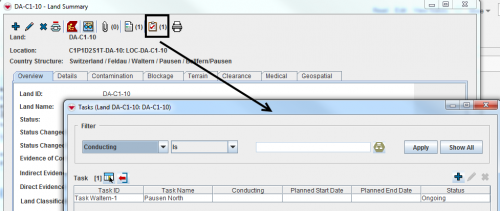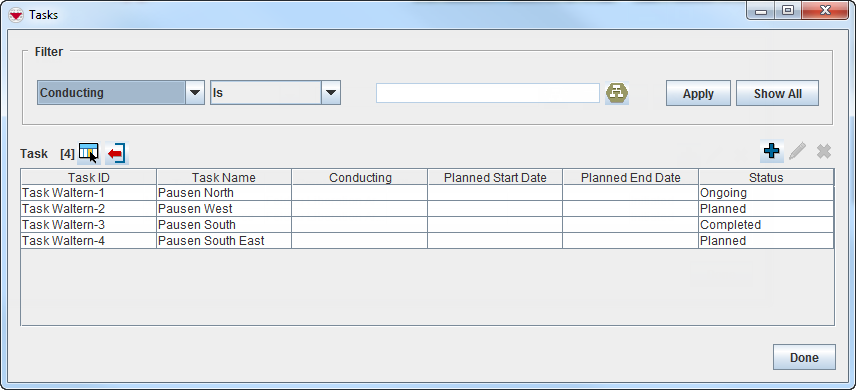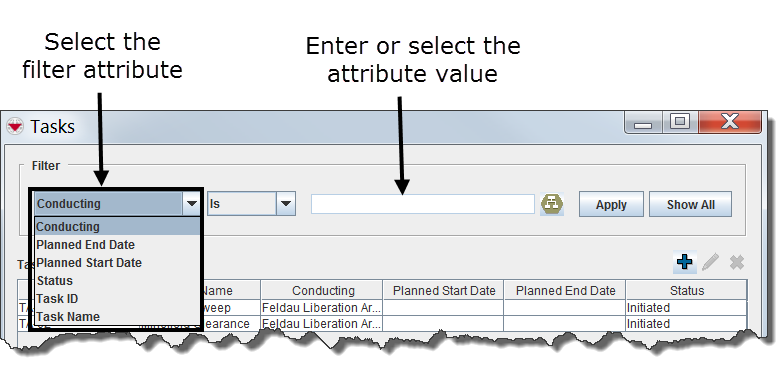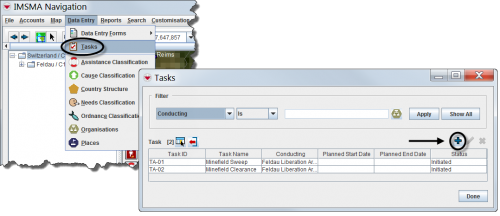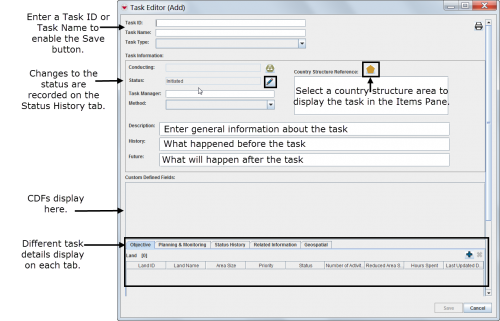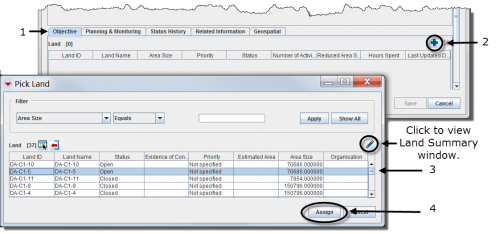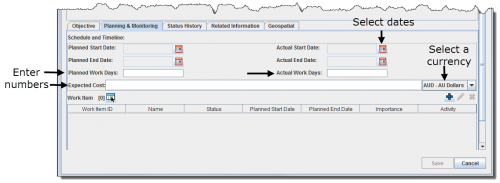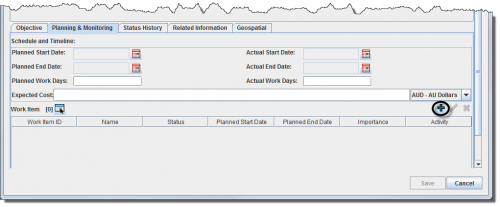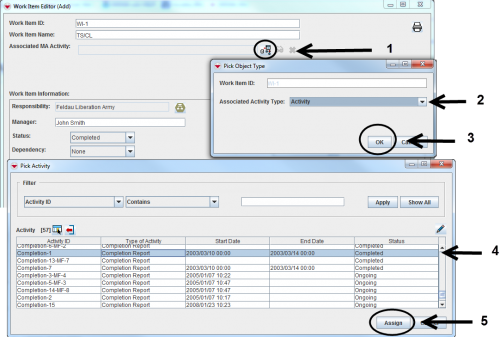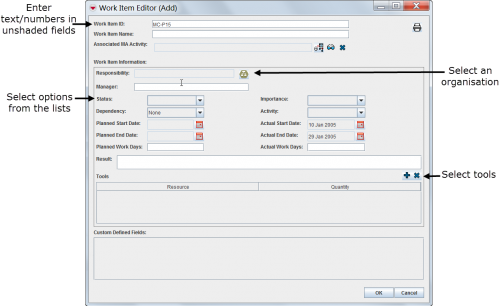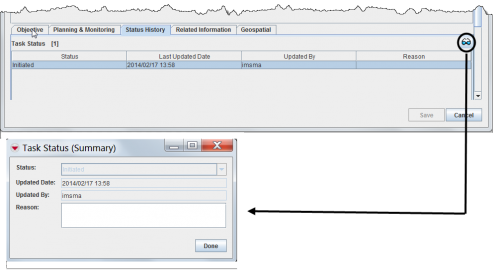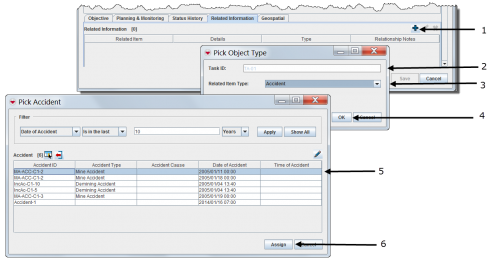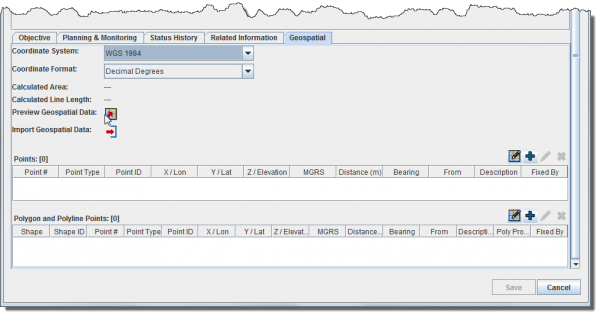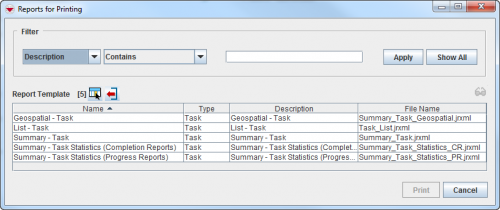Difference between revisions of "Using the Tasking Tool in IMSMANG"
(→Adding Geospatial Data) |
|||
| Line 20: | Line 20: | ||
{| style="border:2px solid lightgray; float:center; margin:10px;" | {| style="border:2px solid lightgray; float:center; margin:10px;" | ||
| − | |align="left" style="padding: 5px 10px 5px 10px"|[[Image:bulb2.png|25px|Represents a tip or note for using IMSMA | + | |align="left" style="padding: 5px 10px 5px 10px"|[[Image:bulb2.png|25px|Represents a tip or note for using IMSMA.]] |
|align="left" style="padding: 5px 10px 5px 10px"| Tasks can be displayed in the items pane by selecting a specific country structure area. | |align="left" style="padding: 5px 10px 5px 10px"| Tasks can be displayed in the items pane by selecting a specific country structure area. | ||
|- | |- | ||
| Line 74: | Line 74: | ||
{| style="border:2px solid lightgray; float:center; margin:10px;" | {| style="border:2px solid lightgray; float:center; margin:10px;" | ||
| − | |align="left" style="padding: 5px 10px 5px 10px"|[[Image:bulb2.png|25px|Represents a tip or note for using IMSMA | + | |align="left" style="padding: 5px 10px 5px 10px"|[[Image:bulb2.png|25px|Represents a tip or note for using IMSMA.]] |
|align="left" style="padding: 5px 10px 5px 10px"| Only hazards, hazard reductions, MREs and QMs can have associated tasks. | |align="left" style="padding: 5px 10px 5px 10px"| Only hazards, hazard reductions, MREs and QMs can have associated tasks. | ||
|- | |- | ||
| Line 89: | Line 89: | ||
[[Image:SopIcon.png|50px]] | [[Image:SopIcon.png|50px]] | ||
{| style="border:2px solid lightgray; float:center; margin:10px;" | {| style="border:2px solid lightgray; float:center; margin:10px;" | ||
| − | |align="left" style="padding: 5px 10px 5px 10px"|[[Image:bulb2.png|25px|Represents a tip or note for using IMSMA | + | |align="left" style="padding: 5px 10px 5px 10px"|[[Image:bulb2.png|25px|Represents a tip or note for using IMSMA.]] |
|align="left" style="padding: 5px 10px 5px 10px"| The objective refers to a single or to several hazards that have the same task. | |align="left" style="padding: 5px 10px 5px 10px"| The objective refers to a single or to several hazards that have the same task. | ||
|} | |} | ||
| Line 119: | Line 119: | ||
{| style="border:2px solid lightgray; float:center; margin:10px;" | {| style="border:2px solid lightgray; float:center; margin:10px;" | ||
| − | |align="left" style="padding: 5px 10px 5px 10px"|[[Image:bulb2.png|25px|Represents a tip or note for using IMSMA | + | |align="left" style="padding: 5px 10px 5px 10px"|[[Image:bulb2.png|25px|Represents a tip or note for using IMSMA.]] |
|align="left" style="padding: 5px 10px 5px 10px"| Work items can be updates or progress reports, planned or completed hazard reductions or QM or MRE activities reporting on indicators that automatically update the [[Using the Tasking Tool in IMSMANG#Viewing Task Statistics | Statistics]] tab. | |align="left" style="padding: 5px 10px 5px 10px"| Work items can be updates or progress reports, planned or completed hazard reductions or QM or MRE activities reporting on indicators that automatically update the [[Using the Tasking Tool in IMSMANG#Viewing Task Statistics | Statistics]] tab. | ||
|} | |} | ||
| Line 141: | Line 141: | ||
{| style="border:2px solid lightgray; float:center; margin:10px;" | {| style="border:2px solid lightgray; float:center; margin:10px;" | ||
| − | |align="left" style="padding: 5px 10px 5px 10px"|[[Image:bulb2.png|25px|Represents a tip or note for using IMSMA | + | |align="left" style="padding: 5px 10px 5px 10px"|[[Image:bulb2.png|25px|Represents a tip or note for using IMSMA.]] |
|align="left" style="padding: 5px 10px 5px 10px"| After associating new objectives and work items, you can click the [[Image:RefreshStatisticsIcon.png | Refresh]] button to refresh the Statistics tab. The most recent time stamp of the data is displayed in the top right corner. | |align="left" style="padding: 5px 10px 5px 10px"| After associating new objectives and work items, you can click the [[Image:RefreshStatisticsIcon.png | Refresh]] button to refresh the Statistics tab. The most recent time stamp of the data is displayed in the top right corner. | ||
|} | |} | ||
| Line 159: | Line 159: | ||
{| style="border:2px solid lightgray; float:center; margin:10px;" | {| style="border:2px solid lightgray; float:center; margin:10px;" | ||
| − | |align="left" style="padding: 5px 10px 5px 10px"|[[Image:bulb2.png|25px|Represents a tip or note for using IMSMA | + | |align="left" style="padding: 5px 10px 5px 10px"|[[Image:bulb2.png|25px|Represents a tip or note for using IMSMA.]] |
|align="left" style="padding: 5px 10px 5px 10px"| You can click the [[Image:ViewIcon.png | View]] button to view a summary of each status change including the date, controlling organisation, and a brief reason for the change. | |align="left" style="padding: 5px 10px 5px 10px"| You can click the [[Image:ViewIcon.png | View]] button to view a summary of each status change including the date, controlling organisation, and a brief reason for the change. | ||
|} | |} | ||
| Line 198: | Line 198: | ||
{| style="border:2px solid lightgray; float:center; margin:10px;" | {| style="border:2px solid lightgray; float:center; margin:10px;" | ||
| − | |align="left" style="padding: 5px 10px 5px 10px"|[[Image:bulb2.png|25px|Represents a tip or note for using IMSMA | + | |align="left" style="padding: 5px 10px 5px 10px"|[[Image:bulb2.png|25px|Represents a tip or note for using IMSMA.]] |
|align="left" style="padding: 5px 10px 5px 10px"| You can disable and hide the geospatial data tab by changing the IMSMA system preferences. Refer to [[Setting System Preferences]]. | |align="left" style="padding: 5px 10px 5px 10px"| You can disable and hide the geospatial data tab by changing the IMSMA system preferences. Refer to [[Setting System Preferences]]. | ||
|} | |} | ||
| Line 221: | Line 221: | ||
==Removing a Task== | ==Removing a Task== | ||
{| style="border:2px solid lightgray; float:center; margin:10px;" | {| style="border:2px solid lightgray; float:center; margin:10px;" | ||
| − | |align="left" style="padding: 5px 10px 5px 10px"|[[Image:bulb2.png|25px|Represents a tip or note for using IMSMA | + | |align="left" style="padding: 5px 10px 5px 10px"|[[Image:bulb2.png|25px|Represents a tip or note for using IMSMA.]] |
|align="left" style="padding: 5px 10px 5px 10px"| Not all tasks can be removed. You cannot remove tasks that contain [[Using the Tasking Tool in IMSMANG#Associating Objectives | Objectives]] or [[Using the Tasking Tool in IMSMANG#Associating Work Items | Work Items]]. However, you can remove tasks that are linked to [[Using the Tasking Tool in IMSMANG#Adding Related Information | Related Information]]. | |align="left" style="padding: 5px 10px 5px 10px"| Not all tasks can be removed. You cannot remove tasks that contain [[Using the Tasking Tool in IMSMANG#Associating Objectives | Objectives]] or [[Using the Tasking Tool in IMSMANG#Associating Work Items | Work Items]]. However, you can remove tasks that are linked to [[Using the Tasking Tool in IMSMANG#Adding Related Information | Related Information]]. | ||
|} | |} | ||
Revision as of 15:24, 21 March 2013
Depending on local standard operating procedures (SOPs), the tasking tool can be used to manage activities for one hazard or several hazards, or for monitoring a specific organisation that was tasked.
The tasking tool automatically retrieves data from the associated work items to produce statistics. This includes cleared area size, devices found and hours spent.
All the compiled information related to the specified task can be viewed and printed from the task manager or the Task Editor window.
| Windows Vista and Windows 7 users, this sign next to a step is a reminder for you that you must right-click executables and choose Run as administrator from the context menu. |
Viewing Tasks
| Represents a tip or note for using IMSMA. | Tasks can be displayed in the items pane by selecting a specific country structure area. |
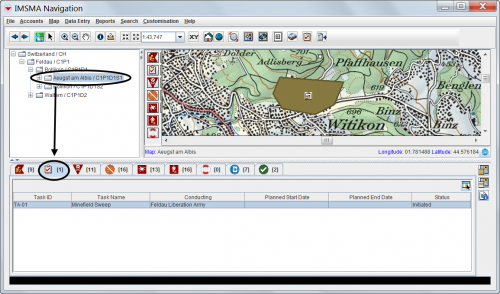
| |
On an Item's Current View
On the Tasks Window
To access the Task window, select the Data Entry menu, and then select Tasks.
Tasks Window
Filtering the Tasks Displayed
By default, all tasks are listed in the table when the Tasks window is opened. You can limit the tasks displayed in the table by selecting specific filter attributes.
Filtering Tasks
To filter the tasks displayed in the Tasks window:
- From the Data Entry menu, select Tasks.
- The Tasks window displays.
- Select the attribute on which you would like to apply the filter from the Filter drop-down list. Filter options for tasks include:
- Current Owner – returns tasks owned by the organisation you selected from the list.
- Current Status – returns tasks with the status value that you selected from the list.
- Task ID – returns tasks with a task ID that contains the specified value.
- Task Name – returns tasks with a task name that contains the specified value.
- Enter or select a value that the selected attribute must be either similar to or contain. Note that the filter is not case-sensitive.
- Click the Apply button.
- Tasks passing the filter are listed in the table.
Adding New Tasks
| Represents a tip or note for using IMSMA. | Only hazards, hazard reductions, MREs and QMs can have associated tasks. |
| 500px | |
Completing General Information Details
Associating Objectives
| Represents a tip or note for using IMSMA. | The objective refers to a single or to several hazards that have the same task. |
- Select the Objective tab in the Task Editor window.
- Click the
 button.
button. - Select a hazard.
- Click Assign.
Associating Work Items
- Select the Planning & Monitoring tab in the Task Editor window.
| Represents a tip or note for using IMSMA. | Work items can be updates or progress reports, planned or completed hazard reductions or QM or MRE activities reporting on indicators that automatically update the Statistics tab. |
- Enter a work item ID or work item name to enable the OK button.
- Associate an MA activity field report.
- Enter general information about the work item.
Viewing Task Statistics
The Statistics tab does not include editable fields. Instead, it compiles metrics from data in the Task Objective and from any IMSMA items associated to the Task. You can use the Statistics tab to monitor useful data such as the status of objectives and work items, and the number and type of each linked IMSMA item.
| Represents a tip or note for using IMSMA. | After associating new objectives and work items, you can click the Refresh button to refresh the Statistics tab. The most recent time stamp of the data is displayed in the top right corner. |
Refreshing the Statistics Tab
Viewing Task Status History
The Status History tab displays a list of status updates made to the task. Each time a user changes the status of a task in the Task Editor window, a new record is entered in Task Statuses table. The following information is displayed:
- The status selected at each status update.
- The date of each status update.
- The username of the person who initiated the status update.
- The reason (if provided) for the status update.
| Represents a tip or note for using IMSMA. | You can click the |
Status History Tab
Adding Related Information
- Select the Related Information tab in the Task Editor window.
- Select auxiliary data, a field report item or a task.
Tasks allow you to manage work that is required as part of your mine action process. You can link tasks to standard IMSMA items or to specific areas on the map, assign task objectives and sub-tasks (called work items), and record other work-related information such as start and end dates, available resources, responsible personnel, and status changes.
Adding Geospatial Data
The geospatial data tab allows you to add, edit, delete, or import geospatial shapes (points, polygons, and polylines) associated with the task. As with other similar windows, you can:
- Add shapes either manually or by drawing on the map
- Select any coordinate reference system and format
- Incorporate bearing and distance measurements
For more information, refer to Geospatial Data.
Geospatial Data Tab
| Represents a tip or note for using IMSMA. | You can disable and hide the geospatial data tab by changing the IMSMA system preferences. Refer to Setting System Preferences. |
Editing Tasks
To view and/or change task information:
- From the Tasks window, select the row associated with the task you would like to view or change.
- Click the
 button.
button. - Change the information as needed. For more information about editing the various data entry fields, refer to Adding New Tasks.
- Do one of the following:
- To save the changes you have made to the task, click Save.
- To discard any changes you have made, click Cancel.
Printing a Task Summary
Removing a Task
| Represents a tip or note for using IMSMA. | Not all tasks can be removed. You cannot remove tasks that contain Objectives or Work Items. However, you can remove tasks that are linked to Related Information. |
To remove a task:
